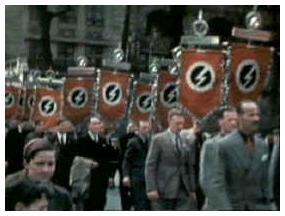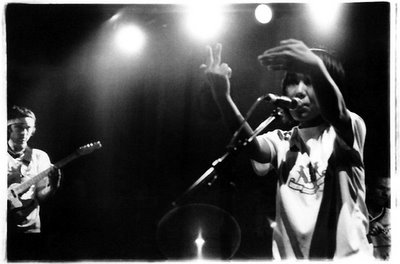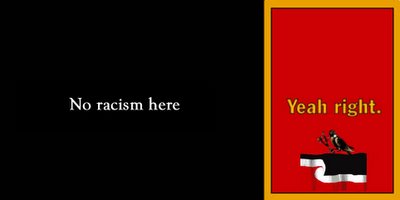
After a good deal of buggerising around by yours truly and his cantankerous editorial committee, the thirty-third issue of
brief, Aotearoa's longest-running journal of innovative literature, has hit the streets, or at least the letterboxes of its long-suffering subscribers. The new issue is one hundred and fifty A 5 pages long, has the loose theme of 'Exile and Home', and includes work by persons as various as
Dr Jack Ross,
Richard von Sturmer,
Dave Bedggood, and
Jill Chan. And no, you stingy bastards, you can't read it online - even the one page ad on the Book Council website that I just linked to is out of date! Here, though, is one of my favourite pieces, a wonderfullly fierce review by the good Doctor:
Tracey Slaughter. Her Body Rises: Stories & Poems. Auckland: Random House, 2005. ISBN 1-86941-726-7. RRP $27.
I’ve just come up with a new acronym: BYTES – for “Bright Young Thing (Either Sex).”Tracey Slaughter is (or, rather, might be seen as being) a byte. She’s won a major literary competition (The Katherine Mansfield award, for her story “Wheat”); she’s had stories and poems in most of the major literary magazines (including a feature in Poetry NZ 25); and now a major publisher has put out her first book.
Unfortunately bytes tend to arouse a certain instinctive antagonism in (at least some of) their writing colleagues. These I would group into two major categories: BOGs – “Bitter Old Gits”; and JABBERs – “Jealous And Belligerent (But Equally-ranked) Rivals.”
Shortly after the publication of Tracey’s book, it received a write-up in the Listener which had to be seen to be believed. The reviewer, Paula Morris, criticised the following things:
• The writing (“clunky sentences, wobbling points of view, and unnecessary tense changes”)
• The structure of the writing (“Basic technical problems undermine many of the narratives”)
• The clarity of the writing (“denseness of imagery often works against sense and clarity”)
• The poetry (“feels a little stale”)
• The stories (“very slight narratives, moments rather than satisfying stories … some …. feel abandoned, not finished”)
• The characterisation in the stories (“Too many of Slaughter’s sensitive girls and desolate women feel interchangeable”)
• The structure of the publication (“shuffling … two genres into unhappy proximity”)
• The speed of publication (“rushing a book into print is no way to launch a career”)
• The design (“fussy layout”)
• The editing (“all suggesting a lack of editorial guidance”)
And apart from all that, how did you like the play, Mrs. Lincoln? Well, apparently there are some good things about the book. The award-winning story “Wheat” itself is an “atmospheric little tale that quivers with emotion” (the choice of the word “little” is a particularly fine touch – just in case all that praise went to the author’s head). What else? Oh, “Slaughter’s lyrical, often perceptive writing” is alluded to (once). Finally, it’s “smart” of Random House to “secure a relationship with her” (though it’s a little difficult to see why, given the “unpolished” nature of the work collected here).
Don’t get me wrong. Paula Morris has a perfect right to her opinion – and even to be harsh in expressing it, it seems to me. What really grates about the review is: 1/ its air of smug superiority, of pissing all over someone from a great height (“atmospheric little tale” – “quivers with emotion”); and 2/ the wholesale nature of the criticism. Virtually nothing escapes Morris’s machine-gun scatter of poisonous ink, including those things normally outside a writer’s control: the design, the hasty production, the very concept of putting out a book of stories and poems … It’s too much. At a certain point one simply stops believing that she feels indignant about all of those things.
I can’t say offhand whether Morris should be classed as a BOG or a JABBER – she would seem insufficiently eminent to fall into the first category, and yet she clearly sees herself as soaring high above writer’s entry-level. If that is indeed so, I’m surprised she can’t see what a nasty taste her piece leaves in the mouth.
All writers are forced to depend on the imaginative sympathy and engagement of their readers – but also on the charity and friendship of their colleagues. I read Tracey’s book before I read any reviews of it, and enjoyed it hugely. Nothing I saw in the Listener has changed that opinion at all.
I think I may be a little more competent to talk about poetry than Morris, who appears to be unable even to find a passage to justify her tag: “a little stale.” How hard can it be to locate a few flat lines in so many (26, by my count) often-lengthy poems? The fact that Morris does not succeed is no inconsiderable tribute to Tracey’s prowess as a poet.
And what’s wrong with putting out a book of mingled poems and stories? Hemingway did it. His first book was called Three Stories and Ten Poems (1923). Certainly it’s unusual, but whoever claimed that the best way to write was to stick to the beaten track? And what’s so “fussy” about the layout of the book? It has some pictures in it, true, and some blank pages. Is that a sin?
While I liked the story “Wheat,” it doesn’t actually strike me as the best story collected here. I prefer “Cuts,” with its brilliant first line:
When a customer got out his penis, as some of the customers had been known to do, the women of Diamante Salon kept up the chatter, their gossip ringing and glinting. …
Now that’s an arresting opening. (Even Morris is forced to admit that some of Tracey’s stories “have very promising first lines … and resonant final lines”). “Sleeping Over” is also particularly creepy and fine.
So the only advice I can give Paula Morris is to get over herself. Greeting anybody’s first book with such a concentrated avalanche of bile and patronising half-praise is a pretty mean-spirited thing to do. When one suspects that it’s motivated by crude envy rather than actual indignation it becomes even more pathetic. I don’t hope for the same thing to happen to her in the near future – I wouldn’t wish it on anyone. But I do think she should be ashamed of herself, and should take a long, hard look at her own reasons for publishing such a silly, malicious piece in a mass-market magazine.
For info on subscribing to brief e mail me.






















